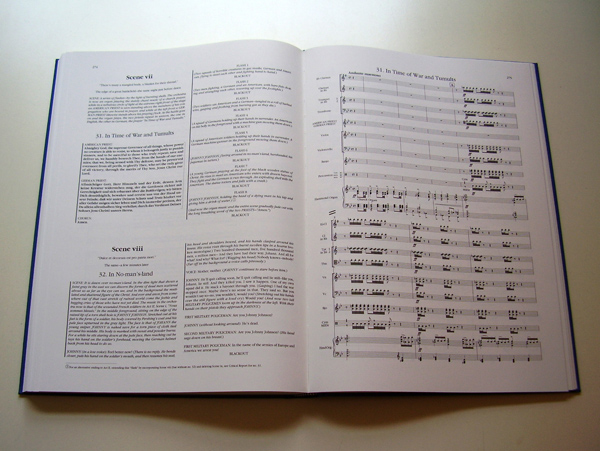Weill’s First American Stage Work Published in Full Score
June 20, 2012: The Kurt Weill Edition has just released its latest volume, Johnny Johnson (Series I, Volume 13), edited by musicologist Tim Carter of the University of North Carolina at Chapel Hill. Originally produced by the legendary Group Theatre in 1936, Johnny Johnson marked Weill’s first contribution to the American musical theater. With book and lyrics by Pulitzer Prize-winning playwright Paul Green, the anti-war musical opened in November 1936 on Broadway, where it enchanted audiences and critics alike. Lee Strasberg directed, and the cast included a young Elia Kazan. When the production closed in 1937, the Federal Theatre Project took up the work and mounted major productions in Boston and Los Angeles. Although Johnny Johnson enjoyed frequent performances by regional and amateur theaters–even a brief Broadway revival in 1971–the work’s publication record left much to be desired. Less than a handful of songs were available as sheet music, and the only published vocal score was deeply flawed.
For the Kurt Weill Edition of Johnny Johnson, Carter drew on a vast array of surviving source materials, including not only Weill’s manuscripts but also rehearsal scores and sets of instrumental parts, often containing several layers of chaotic performance annotations. The edition presents Johnny Johnson in full score, with the complete spoken text placed between the musical numbers. Carter’s magisterial introductory essay illuminates the work’s genesis and performance history, the editorial process, and performance issues. Eleven plates with facsimiles illustrate editorial challenges and solutions. A separately published critical report documents every step of the editorial process and provides additional information for future stagings.
Weill’s ingenious orchestration for Johnny Johnson, recalling those for The Threepenny Opera and Mahagonny Songspiel, requires 11 players: clarinet, alto sax, 2 trumpets, trombone, 2 violins, cello, guitar, percussion and Hammond organ. New performance materials (parts and vocal score) derived from the edition will be available for rental in autumn 2012.
Tim Carter, David G. Frey Distinguished Professor of Music at the University of North Carolina at Chapel Hill, is an expert on early baroque opera, Mozart’s operas, and Broadway musicals. His landmark study of Oklahoma! was published in 2007 by Yale University Press.
Copies will be available from U.S. dealers at the end of July.
Kurt Weill Edition (Series I, Volume 13): Johnny Johnson, ed. Tim Carter (New York: Kurt Weill Foundation for Music / European American Music Corporation, 2012). Main Volume: 348 pp.; Critical Report: 116 pp. ISBN: 978-0-913574-69-0. Sales Price: $440 ($295 for subscribers). Order no. KWE 1013.
###
If you’d like more information about this topic, please contact Kate Chisholm at the Kurt Weill Foundation: (212) 505-5240 or kchisholm@kwf.org.



